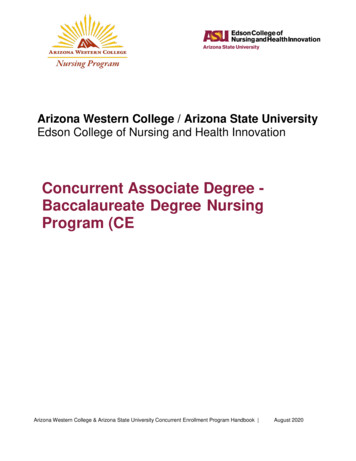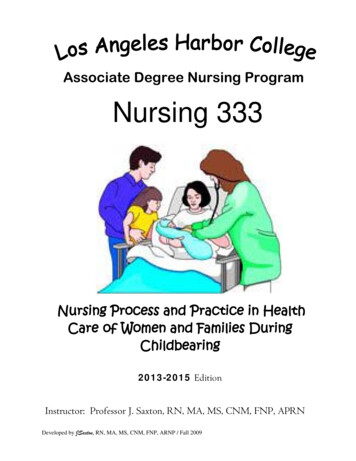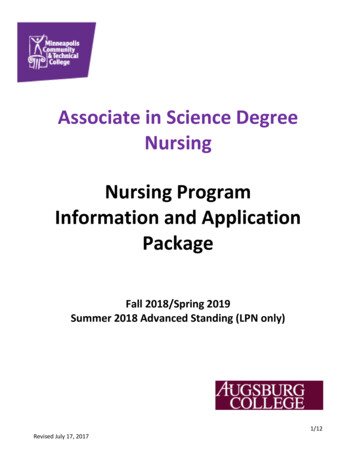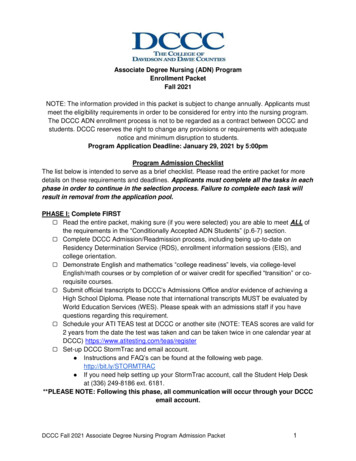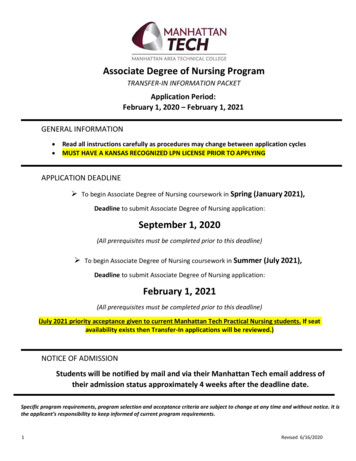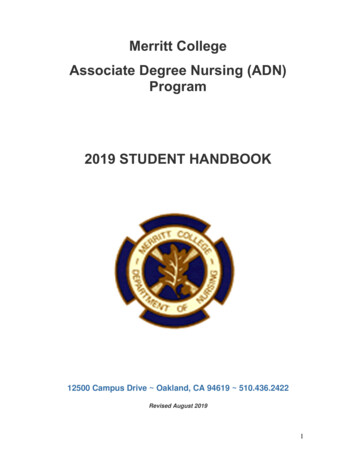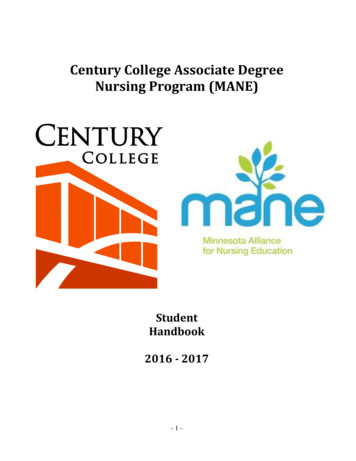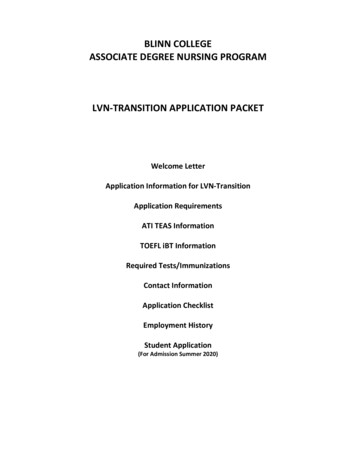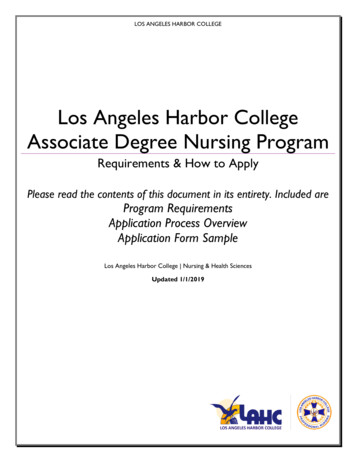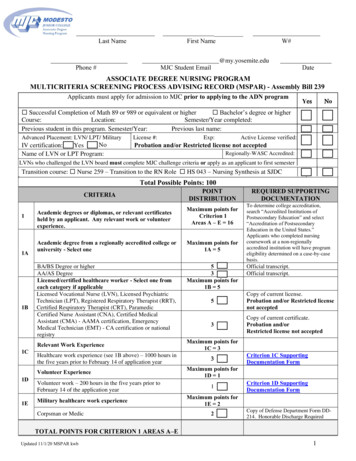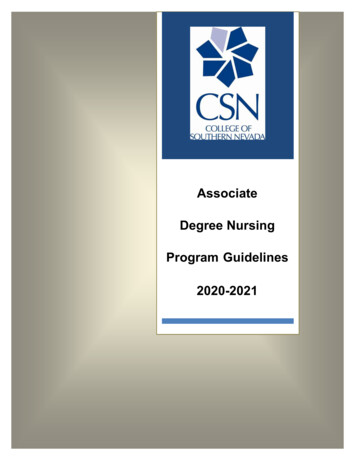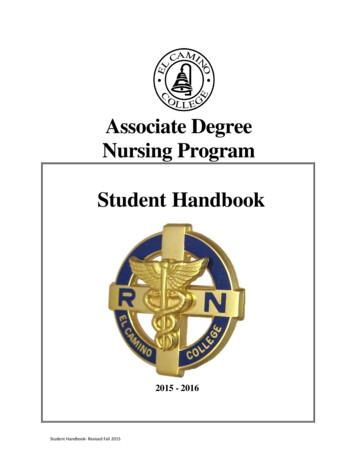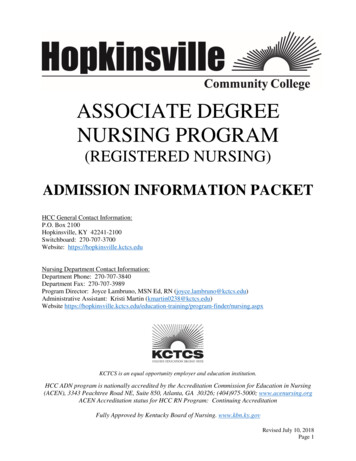
Transcription
ASSOCIATE DEGREENURSING PROGRAM(REGISTERED NURSING)ADMISSION INFORMATION PACKETHCC General Contact Information:P.O. Box 2100Hopkinsville, KY 42241-2100Switchboard: 270-707-3700Website: https://hopkinsville.kctcs.eduNursing Department Contact Information:Department Phone: 270-707-3840Department Fax: 270-707-3989Program Director: Joyce Lambruno, MSN Ed, RN (joyce.lambruno@kctcs.edu)Administrative Assistant: Kristi Martin (kmartin0238@kctcs.edu)Website program-finder/nursing.aspxKCTCS is an equal opportunity employer and education institution.HCC ADN program is nationally accredited by the Accreditation Commission for Education in Nursing(ACEN), 3343 Peachtree Road NE, Suite 850, Atlanta, GA 30326; (404)975-5000; www.acenursing.orgACEN Accreditation status for HCC RN Program: Continuing AccreditationFully Approved by Kentucky Board of Nursing. www.kbn.ky.govRevised July 10, 2018Page 1
HOPKINSVILLE COMMUNITY COLLEGEMISSION STATEMENTHopkinsville Community College is a member of the Kentucky Community and Technical College System and is apublic two-year degree granting institution.Hopkinsville Community College is accredited with the Southern Association of Colleges and Schools Commissionon Colleges to award associate degrees. Contact the Commission on Colleges at 1866 Southern Lane, Decatur,Georgia 30033-4097 or call 404-679-4500 for questions about the accreditation of Hopkinsville CommunityCollege.Note: The Commission is to be contacted only if there is evidence that appears to support an institution’s significantnon-compliance with a requirement or standard.MissionHopkinsville Community College is an inclusive, student-centered educational institution that provides accessible,innovative, and comprehensive learning opportunities within a supportive community that encourages academicexcellence. The college sustains strong educational, community, military, agricultural, and economic partnerships toimprove quality of life in the southern Pennyrile region and Fort Campbell and enables students to be responsiblecitizens in a global society.Hopkinsville Community College promotes excellence in teaching and learning by offering: Degree, diploma, and certificate programs and courses that enable students to:o transfer to four-year institutions, ando acquire the knowledge and skills for new or continued employment;Developmental, academic and support services that promote student success;Customized business and industry training;Continuing education and community outreach; andAdult education.Last approved by the KCTCS Board of RegentsMarch 2017VisionThe first-choice institution of higher education and workforce training in our region.Values Academic excellence and life-long learningAccess and student successStewardship of human, fiscal, capital, and environmental resourcesLeadership and community engagementInclusion, multiculturalism, globally focusedContinuous improvementStrong partnership with the military communityVision and Values were last approved by Faculty/Staff in April 2016 and by Board of Directors in May 2016.Revised July 10, 2018Page 2
KENTUCKY COMMUNITY & TECHNICAL COLLEGE SYSTEMASSOCIATE DEGREE NURSING PHILOSOPHYThe philosophy of the Associate Degree Nursing program is congruent with the Kentucky Community andTechnical College System (KCTCS) mission statement and is supported by the works of Marjory Gordon and theNational League for Nursing. The faculty believes that: Each individual is a unique, holistic being with bio-psychosocial, cultural and spiritual dimensions inconstant interaction with the environment. All human beings have in common certain functional patternsthat contribute to their health, quality of life, and achievement of human potential; The dynamic process of mastering core competencies is essential to the practice of contemporary andfuturistic nursing. This process illustrates the personal, progressive, and lifelong professional developmentof the nurse through the accumulation, analysis, and synthesis of knowledge, scientific findings and humanexperience. The components of this ADN conceptual model include: core values, integrating concepts,program outcomes and nursing practice; Learning is an individual and lifelong process evidenced by changed behavior resulting from theacquisition of knowledge, practice and ethical comportment. Knowledge encompasses the realms ofscience and theory. Practice includes the ability to engage in a thoughtful, deliberate, and informed way.Ethical comportment involves the individual’s formation within a set of recognized responsibilities; itincludes the notions of “good practice” and “boundaries of practice”. Learning in an educational setting isenhanced by a teacher/student relationship in which the teacher’s responsibility is to structure and facilitateoptimal conditions for critical thinking and learning through clearly defined student learning outcomes. Thestudent brings to this relationship the willingness to learn and is accountable for his/her education.Recognizing that both the rate and style of learning differ with individuals, various strategies are utilized tofacilitate the achievement of student learning outcomes, attainment of maximum potential, and promotionof continued learning; The A.D.N graduate, having achieved the graduate outcomes, is prepared to practice in a variety of settingswithin the parameters of individual knowledge and experience according to the standards of practice. Therole of the A.D.N. graduate includes human flourishing, nursing judgment, professional identity, and spiritof inquiry. Encompassed within these roles are the core components of context and environment,knowledge and science, personal/professional development, quality and safety, relationship-centered care,and teamwork.References:National League for Nursing. (2010). Outcomes and Competencies for Graduates of Practical/Vocations, Diploma,Associate Degree, Baccalaureate, Master’s, Practice Doctorate and Research Doctorate Programs inNursing. New York, NY: National League for Nursing.Gordon, M. (1986). Nursing diagnosis: Process and application. 3rd edition, St. Louis: Mosby.Revised July 10, 2018Page 3
HOPKINSVILLE COMMUNITY COLLEGEASSOCIATE DEGREE NURSING PHILOSOPHYIn addition to the KCTCS Associate Degree Nursing Philosophy, the Hopkinsville Community College NursingFaculty ascribe to the Boyer’s definition of scholarship. Boyer (1997) describes the four elements of scholarship asteaching, integration, application, and discovery.The faculty believes teaching is the central element of scholarship and is the primary focus as a faculty member. Thenursing faculty strives to maintain best practice and competency in teaching by participating in professionaldevelopment activities on the local, regional and state levels as well as attendance to national conferences in order tomaintain currency in methods and practices in education.Integration is another element identified by Boyer that focuses on making connections across disciplines. Thefaculty continues to develop relationships with other faculty outside the nursing department to encouragecollaboration and to improve the preparation of the nursing students for the nursing program.The element of application is using the research and innovations in the service of the field of nursing to benefitorganizations and professional associations. The faculty is involved in various organizations and activities outsideHCC to contribute the individual’s nursing expertise to the community and the profession.Discovery is the element that is related to research. The faculty continues to research and apply best practices fromcurrent literature about nursing practice and the practice of nursing education.Revised July 10, 2018Page 4
KENTUCKY COMMUNITY & TECHNICAL COLLEGE SYSTEMASSOCIATE DEGREE NURSINGCONCEPTUAL FRAMEWORKThe conceptual framework for the Associate Degree Nursing Program as developed and valued by the faculty isbased upon constructs of the nursing paradigm and related concepts.The framework relates the philosophy to the curriculum and provides focus for the program. It organizes andexplains the relationships and defines nursing practice, explaining the relationships between the concepts of thephilosophy and depicting the seven core values with their six integrated concepts and eleven functional healthpatterns.The faculty members believe that nursing practice includes human flourishing, nursing judgment, professionalidentity, and spirit of inquiry that are based on the National League for Nursing educational program outcomes forA.D.N. graduates and Marjory Gordon’s functional health pattern framework.Fundamental to the framework are the seven core values of caring, diversity, ethics, excellence, holism, integrity,and patient centeredness. The six integrating concepts of nursing practice are: context and environment, knowledgeand science, personal/professional development, quality and safety, relationship-centered care, and teamwork. Thecore values and integrating concepts are introduced, developed, and built upon throughout the curriculum.The patient’s functional health patterns are: health perception/health management, nutrition/metabolism,elimination, activity/exercise, sleep/rest, cognitive/perceptual, self-perception/self-concept, role/relationships,sexuality/reproduction, coping/stress tolerance, and value/belief. These patterns are influenced by the patient’sculture, age/development, and state of health/illness and serve as a unifying structure for the organization of thecurriculum.The conceptual model is a visual representation of the relationships among the concepts of the philosophy anddepicts all components inherent in nursing practice and the eleven functional patterns inherent in the patient.References:National League for Nursing. (2010). Outcome and competencies for Graduates of Practical/Vocations, Diploma,Associate Degree, Baccalaureate, Master’s, Practice Doctorate, and Research Doctorate Programs inNursing. New York, NY: National League for Nursing.Gordon, M. (1986). Nursing Diagnosis: Process and Application. 3rd edition, St. Louis: Mosby.Revised July 10, 2018Page 5
KENTUCKY COMMUNITY & TECHNICAL COLLEGE SYSTEMASSOCIATE DEGREE NURSINGGRADUATE/STUDENT LEARNING OUTCOMES (SLO’S)Upon completion of this program, the Associate Degree Nursing graduate can:1.2.3.4.5.6.7.Advocate for patients and families in ways that promote their self-determination, integrity, and ongoinggrowth as human beings (human flourishing);a. Develop, implement and evaluate individualized plans of care focusing on services and activities thatpromote independence, maintain or restore health, or support a peaceful death;b. Advocate for the access to and quality of care for patients;c. Use teaching/learning processes to facilitate the patients in informed decision-making to achievepositive outcomes and support the patient’s functional patterns;d. Provide culturally competent care that demonstrates respect for diverse patients;Make judgments in practice, substantiated with evidence, that integrate nursing science in the provision ofsafe, quality-care and promote the health of patients within a family and community context (nursingjudgment);a. Utilize the nursing process while incorporating Gordon’s functional health patterns as a basis forclinical judgment to optimize outcomes of care for the patient, family, and community;b. Perform essential nursing skills as identified by the critical criteria;c. Collaborate with the patient, family, significant others and members of the health care team in themanagement of care;d. Establish and maintain effective/therapeutic communication with patients, families, significant others,and members of the health care team;e. Manage the direct provision of nursing care through effective organizational skills, appropriatedelegation, and supervision within the scope of practice;f. Employ principles of quality and safety, healthcare policy, and cost effectiveness to improvehealthcare outcomes;Implement one’s role as a nurse in ways that reflect integrity, responsibility, ethical practice and anevolving identity as a nurse committed to evidence-based practice, caring, advocacy, and safe, quality carefor diverse patients within a family and community context (professional identity);a. Recognize situations beyond one's knowledge and experience, and seek consultation from appropriateresources in changing healthcare environment;b. Integrate caring behaviors in managing care;c. Exhibit professional behaviors/practice as defined by the ethical, legal, and regulatory frameworks ofnursing;d. Use information and technology to communicate, manage knowledge, mitigate error and supportdecision making;Examine the evidence that underlies clinical nursing practice to challenge the status quo, questionunderlying assumptions, and offer new insights to improve the quality of care for patients, families, andcommunities (spirit of inquiry);a. Recognize and examine evidence-based literature/research for use in nursing practice;b. Value continuous learning within the nursing profession;Communicate effectively;a. Read and listen with comprehension;b. Speak and write clearly using standard English;c. Interact cooperatively with others using both verbal and non-verbal means;d. Demonstrate information processing through basic computer skills;Think critically;a. Make connections in learning across the disciplines and draw logical conclusions;b. Demonstrate problem solving through interpreting, analyzing, summarizing, and/or integrating avariety of materials;c. Use mathematics to organize, analyze, and synthesize data to solve a problem;Learn independently;a. Use appropriate search strategies and resources to find, evaluate, and use information;b. Make choices based upon awareness of ethics and differing perspectives/ideas;c. Apply learning in academic, personal and public situations;d. Think creatively to develop new ideas, processes, or products;Revised July 10, 2018Page 6
8.Examine relationships in diverse and complex environments;a. Recognize the relationship of the individual to human heritage and culture;b. Demonstrate an awareness of the relationship of the individual to the biological and physicalenvironment;c. Develop an awareness of self as an individual member of a multicultural global community.Revised July 10, 2018Page 7
ELIGIBILITYNursing involves the provision of direct care for individuals and is characterized by the application of verifiedknowledge in the skillful performance of nursing functions. Anyone who makes application to the college as adegree-seeking student may apply to the Hopkinsville Community College Associate Degree Nursing Program.Admission to the program is open to all qualified students regardless of economic or social status and withoutdiscrimination, on the basis of race, color, sex, marital status, beliefs, age, national origin or disability.All applicants for the nursing program should possess: sufficient visual acuity, i.e. to accurately prepare and administer medication and to participate in theobservation necessary for client assessment and nursing care. sufficient auditory perception to receive verbal communication from client and members of the health careteam as well as to assess health needs of people through the use of monitoring devices such as cardiacmonitors, stethoscopes, IV infusion pumps, dopplers, fire alarms, etc.; sufficient gross and fine motor coordination to respond promptly and to implement the skills, including themanipulation of equipment, required in meeting health needs; sufficient communication skills (speech, reading, writing) to interact with individuals and to communicatetheir needs promptly and effectively as may be necessary in the individual’s interest; sufficient intellectual and emotional functions to plan and implement care for individuals; the ability to lift and/or move up to 50 pounds and; the ability to be on feet for 8 – 12 hour clinical.Enrollment in the Associate Degree Nursing Program may be limited because of available laboratory facilities in thecommunity, as well as limited faculty and financial resources at the community college.TIME COMMITMENTThe Associate Degree Nursing Program is a vigorous and intense program of study. Success in the program requiresa major commitment to make studying a priority. Study outside of class is a requirement as well as practice time fornursing skills. Working more than 20 hours/week is discouraged due to the time requirements in the program.Students need to have good time management skills as well as assistance with childcare and finances.Revised July 10, 2018Page 8
ADMISSION REQUIREMENTS FOR THE RN PROGRAMAcceptance into the Associate Degree Nursing program is based upon a selective admission process. The KCTCSsystem guidelines and HCC admission guidelines will be followed. In addition, the HCC Nursing Programrequirements must be met.Deadlines are May 15th for the Fall admission cycle and October 30th for the Spring admission cycle. Requirementsthat must be submitted are listed below.BY APPLICATION DEADLINE OF EITHER MAY 15TH OR OCTOBER 30TH: Submit an application to Hopkinsville Community College to the Admissions Office. All collegeadmission requirements must be met. Submit official college transcripts to the Office of the Registrar for evaluation. The Registrar’s office hasthe final determination in what credits will transfer from other institutions. Submit official ACT or SAT scores to the HCC Admissions Office. Minimum acceptable score forconsideration to the RN Program is an ACT composite of 20 or an SAT combined score of 940 in criticalreading and math.o The writing portion of the ACT is not required for the nursing program.o NOTICE: Do not assume the Nursing Department has your ACT or SAT score. Please follow upwith the Admissions Office or the Nursing Department to confirm.o Please see next page for Waivers to the ACT/SAT requirement. Attend a Nursing Pre-Admission Conference (PAC) where the nursing program applications will bedistributed. Dates, times, and locations will be available on the Nursing website or by contacting thedepartment. Complete the National League for Nursing (NLN) Pre-Admission Exam (PAX-RN).o To be considered eligible, an applicant must earn a minimum composite score of 111.o A student may only re-take the PAX-RN exam once every six (6) weeks.o PAX-RN scores expire after three (3) years.o To register for the PAX-RN, please nlntesting/. Submit a Nursing application to the Nursing Department staff. Must be in good academic standing with the College with at least a 2.0 GPA with a grade of C or higher inall math, science, and pre-requisite courses.REQUIREMENTS THAT CAN BE MET AFTER THE APPLICATION DEADLINE: Completion of BIO137, PSY110, and Quantitative Reasoning course (such as MAT150 or STA220).o If seeking Fall admission, applicants must complete these requirements with a minimum grade ofC by the end of the Summer term. This means students may enroll in the courses during Summerterm. However, if they are not successfully completed by a student who is accepted to theprogram, the student MUST decline his/her seat and reapply for a later admission cycle.o If seeking Spring admission, applicants must complete these requirements with a minimum gradeof C by the end of the Fall term. This means students must be enrolled in the courses during theFall term even if they are not completed by the October 30 deadline. If an applicant is accepted tothe program and does not successfully complete the prerequisite courses by the end of Fall term,he/she MUST decline the seat and reapply for a later admission cycle. Achievement of nurse aide certification (CNA)o If seeking Fall admission, applicants must be on a state nurse aide registry with an activecertificatio
Oct 18, 2007 · The faculty members believe that nursing practice includes human flourishing, nursing judgment, professional identity, and spirit of inquiry that are based on the National League for Nursing educational program outcomes
